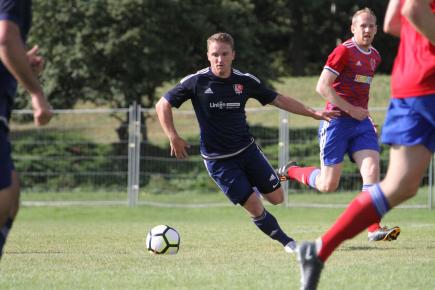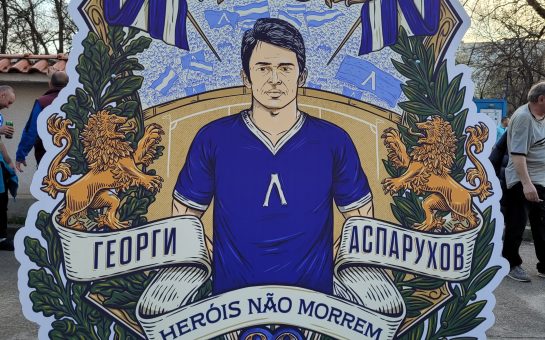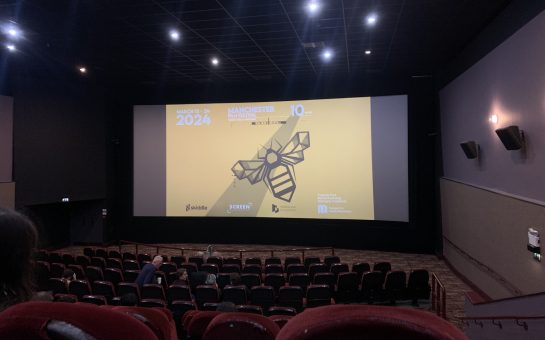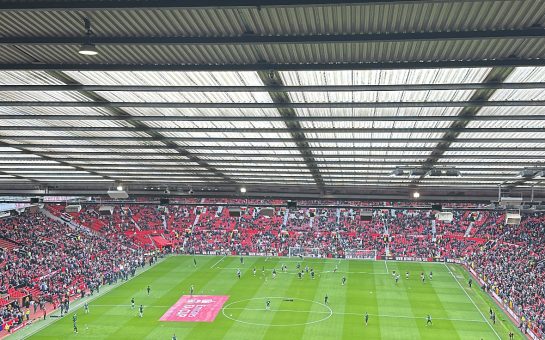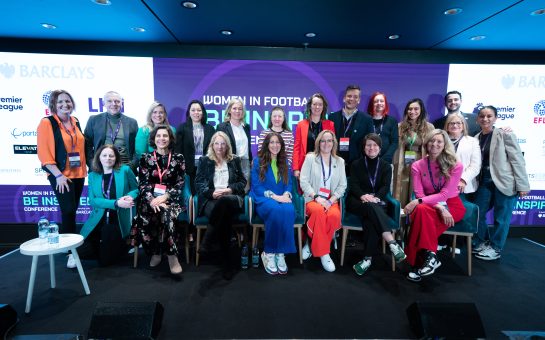It’s a Saturday, and that means that it’s game day for Village Manchester FC. This week they’re taking on Salford Victoria Reserves at their new home ground, Trinity Sports Centre. From the outside this is just like any other match in the Lancashire and Cheshire league, but this is the best gay team in Europe. Or so they claim.
Some will be able to deduce from the name that the club is associated with the city’s famous gay village, but now it’s grown to represent so much more than that. Steve Joyce is VMFC’s Treasurer and Visual Communications Officer, and has seen some significant changes over his seven years at the club.
“We’ve had Africans, Brazilians, Americans, Canadians, always Irish and we’ve had a few Eastern Europeans, so it really is a massively mixed team,” he recounts.
“The difference is now that the straight lads are coming of their own accord, I would say that they’ve been dragged along by their gay mates but it’s actually the other way around; the straight lads have dragged along their gay mates to make them feel comfortable.”
Steve is the best man to ask about the journey that the club has come on. In 2016, the club’s 20th anniversary, he took it upon himself to delve into the archives and dig out the team’s short history.
“It was one or two guys that had been involved with Stonewall Football Club in London, the first [LGBT club] in the UK, then came back to Manchester and said: ‘Why don’t we?’ And they did.
“I think in the early days, they really struggled, and it was probably 18 months before the team even won a game, but then they progressed and got more players.”
In the club’s formative years, they played in and won the Manchester Accountants League, which they remained in until 2016. They also participated in the Gay Football Supporters’ Network (GFSN) Cup, which they first won in 2008 and did so again 10 years later.
“We’ve also won some daft stuff, some small tournaments that don’t really matter, but it makes you feel good when you win them.”
Whilst they have participated in a number of GFSN tournaments and leagues, the club have spent the majority of their history playing in straight competitions. Predictably, throughout that time, players and supporters have been on the receiving end of homophobic abuse. However, Steve has seen things change.
“I think there is generally a change in British society. We’ve got equal marriage now, which ten years ago you wouldn’t have thought of, and British society hasn’t collapsed since then.”
“I think there has been a changing opinion of the British people generally. That’s not to say some of the lads still haven’t experienced problems, we’ve still had homophobia on the pitch in the last two or three years.”
VMFC’s impact has been felt beyond the Village. Rob Dougal is an openly gay footballer in the Manchester Football League. For him and other sportspeople like him, the club have proven that LGBT players have a place in the sport.
“Like most people, I started playing football when I was a kid. As I grew older, other lads started talking about girls and I’d just join in to fit in. Years ago I heard about the Village football club and it allowed me to feel far more comfortable being gay and playing football. I told my current club that I was gay when I joined and no one has had any issues with it.”
For others, the club has been a route back into football. Brendan McKenna is 21 years old and a newcomer to the club. He spent nine months away from football after anxiety over his sexuality kept him away from the game. After it was recommended to him, VMFC has been a way back into playing the sport.
“My work manager’s husband plays for the team, and he suggested them about two years ago but at time I wasn’t ready. He egged me on again and after one session I knew I wanted to stay.
“I’ve kind of had difficulties with homophobia in football for a few years, but when I first joined this team and I started playing for them I kind of realised that it’s a kind of community where I feel included.”
That inclusion isn’t isolated to football. Though they’re all independent of each other, the Village has a huge variety of sports teams and societies, from water polo through to line dancing. VMFC have quite a tight connection with the Village’s rugby team, and Steve has managed to do socials outside of drinking.
“We get to know them and do socials with them, and we used to do something each summer called rugball where we’d play half a game of football and half a game of rugby but watching rugby players trying to kick a ball straight was hilarious and watching our lot trying to run with the ball was hilarious.
“There’s loads so it means different things to different people. It adds something to the Village that isn’t just going out and getting pissed.”
One huge date in the teams’ calendars is the Gay Games. Founded as the Gay Olympics back in 1982, the Gay Games are a multi-sport event every four years that look to promote LGBT groups and sexual diversity. VMFC take part in the EuroGames and European Championships, but the Gay Games spans the whole world.
“A lot of Village teams probably went, though they didn’t come with us. When you go to these massive Games you’re quite insular because we’re playing football 10 miles out of Paris, so we don’t see any of the other sports.
“You see literally thousands of sport people at the opening ceremony, but you don’t necessarily see them taking part in anything because you’re playing football. Once the opening ceremony is over, it does feel like you’re just at a big football tournament.”
The Gay Games in Paris last summer are the reason why Steve calls the club the best gay team in Europe. Though the first team came away with no silverware, they went all the way to the final against American side West Hollywood, only to be beaten on penalties.
“We were the best European side there. West Hollywood were probably technically on a par with us, but they were just physically so much stronger. You can just imagine a typical Hollywood, Los Angeles sports team, and that’s exactly what they looked like.”
When VMFC went to Paris, it was almost their 20th tour abroad. It’s a phenomenon quite alien to most who play Sunday league football, but Steve believes it’s part of the club’s DNA.
“Touring is a crucial part of the club. It’s probably something that a lot of straight football teams don’t have any experience of whatsoever, and if they do it would be just a case of booking with a sports agency and not knowing any of the teams. Whereas all the games we go to, we know a lot of the teams.”
Whilst touring has always been a mainstay at the club, the ethos has always been far simpler. The people involved just turn up to play football, no matter of their sexuality. However, if new players are not on board with the inclusivity of the club, then it’s clear that the club don’t want them either.
“We introduce new players to the club and make sure that they know it’s an LGBT club first and foremost because certainly some of the lads who just turn up might not know that. They might just see this team on Wednesday nights and think that we look organised so they see if they can join in.
“We used to play at a park in Salford so we used to get a lot of players that just lived round there who see us and just want to join in. But we make sure that they know what kind of team it is, and we’re quite honest with them, if they’re happy with that then they join in, and if they’re not then bugger off. This is our club.”
Steve speaks of players that have been at the club for almost 20 years, but he doesn’t think how senior players are or how long they’ve been playing correlates to how involved they are with the club.
“I don’t think it’s really how long you’ve been around or how old you are because we’ve got oldies that don’t necessarily get involved in the social scene as much and we get younger ones that don’t, but then we get some who do.
“What we try and do is mix up the socials. For example, we’ve just moved our home ground to Trinity Sports Centre, which is near the University. There’s a great pub nearby so we’ve started going to the pub after training, which is going to be great because there will be some straight guys who aren’t against it, but just don’t really fancy coming down the Village all the time.”
How cold and wet were we on the sidelines yesterday as we watched the First Team beat Waterloo Firsts 3-2 in the L&C Rhodes Cup?! Warm glow from the win though
Sponsored by @lintentech pic.twitter.com/kqcGglN02i
— VMFC (@villagemancfc) December 16, 2018
The value of the club is not in years of service, but how invested the players are in what the club stands for. Brendan became secretary of the club within five weeks and without knowing most of the players’ names. Like many others he’s been swept up in the club, and understands its importance in modern society.
“With football being so masculine you tend to get very masculine guys who think that sexuality is a choice, and that it is wrong. I’m not there to meet anyone, and I just want to play football. At the end of the day sexuality shouldn’t be brought into football or into sport at all, it’s got nothing to do with football.”
Steve agrees, and believes that the club still has a part to play in changing perceptions of the relationship between the gay community and football, but beyond that it still has a place as a home of football.
“Interviewers always ask if we still need LGBT clubs, and after 20 years we still need them for fighting homophobia on the pitch, and we still haven’t got an out player in the Premier League, even though statistically you’d be bonkers to think there aren’t gay players.
“We’ve still got 21-year-olds coming to this club saying that they’ve been uncomfortable in straight teams. What people forget is that we want there to be a club, it’s not just a case of needing one.
“So when we’ve got a straight guy from Cape Verde playing for us, he hasn’t got anything like the shared background of the rest of us. He’s seeing us as a great team and getting involved.
“We used to play Jewish teams in our old league, and it’s their background and this is our background. We’ve got a common background and now we’re just mates, so there’s also that angle. People forget football clubs are basically a great big bunch of mates.”
It’s easy to say that VMFC are more than a football club. Yes, they represent inclusive. Yes, they represent a safe space for gay players. And yes, they represent the change that they’d like to see in football.
Whilst that is apparent, what’s more poignant is that they don’t need to be. Fundamentally, they are a football club, and will always be no matter how football or society as a whole changes. Village Manchester are here to play and here to stay, whether you like it or not.
